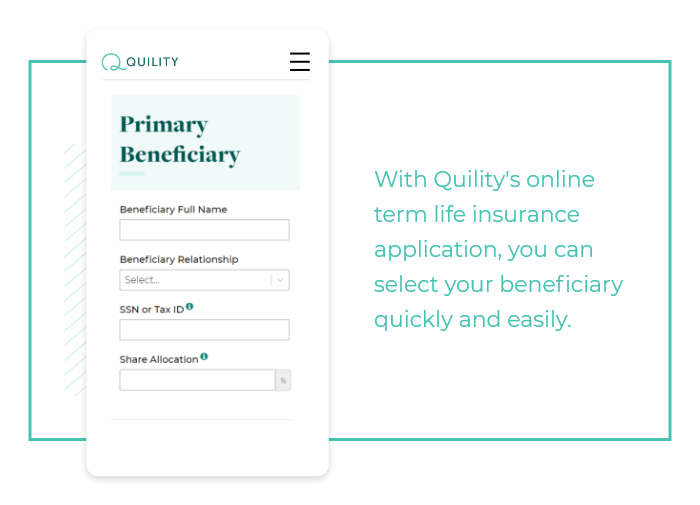When you purchase a new life insurance policy, you’ll be asked to select a beneficiary who will receive the death benefit of your policy when you pass away. Choosing a beneficiary is one of the most important decisions you’ll make when it comes to life insurance, and it’s a decision that comes with trust on your part and responsibility on theirs.
We’re covering the basics of beneficiaries, how to assign your beneficiaries, and clarifying some common terms to help you make the most informed decision.
With this designation comes a lot of financial responsibility, so the beneficiary you choose should be someone you trust to make important decisions. Many individuals designate their spouse or partner as their primary beneficiary.
It is not recommended to add your children as primary beneficiaries on your life insurance policy. If you designate a minor and you pass away, the death benefit will be assigned to a court-appointed guardian until your child legally becomes an adult. If you want to provide for your young children with life insurance, the best way to do so is to designate a trusted member of your family or a loved one as your beneficiary to distribute the funds as you wish.
Another option is to designate a non-profit organization or charity as your beneficiary. If your family doesn’t rely on you financially, this could be a good way to give back to a cause you are passionate about.
The primary beneficiary is the first person who would receive the benefits of the policy when you pass away. You may also name a contingent beneficiary (also known as a secondary beneficiary) on your policy; this individual would inherit the death benefit if your primary beneficiary dies.
For example, you might choose that your spouse receives 100% of the death benefit, and then you could designate your two children as contingent beneficiaries: 50% of the benefit would go to your son and 50% to your daughter if you and your spouse passed away.
You can also name more than one primary or contingent beneficiary. If you prefer to list two or more individuals as a primary beneficiary, you will need to ensure that the percentage of the share they receive equals 100%. This works the same for contingent beneficiaries.
When you pass away, your designated beneficiary will need to send a few documents to the insurance company. You must inform all of your beneficiaries that they are listed on your policy, as the insurance company is not required to reach out to a beneficiary on the deceased policyholder’s behalf.
In most cases, your beneficiary will need to submit a death claim form, a certified copy of the death certificate, and possibly additional information based on the insurance company you purchased a policy with.

Life insurance is for your loved ones, and the death benefit from your policy is designed to provide financial protection for your children, your partner or spouse, your family, or even for your small business if you were no longer around.
Choosing a beneficiary is one of the most important decisions you can make when you get life insurance. If you need any support in your decision, a Quility advisor is available to answer any of your questions, from choosing a policy to designating your beneficiaries.
Ready to get started? Our online application for term life insurance takes less than ten minutes to complete. Protect your legacy today and get a policy in place for your beneficiaries in just a few simple steps.
Let’s Get Started
If you are ready to get coverage now, our online application takes less than ten minutes.








